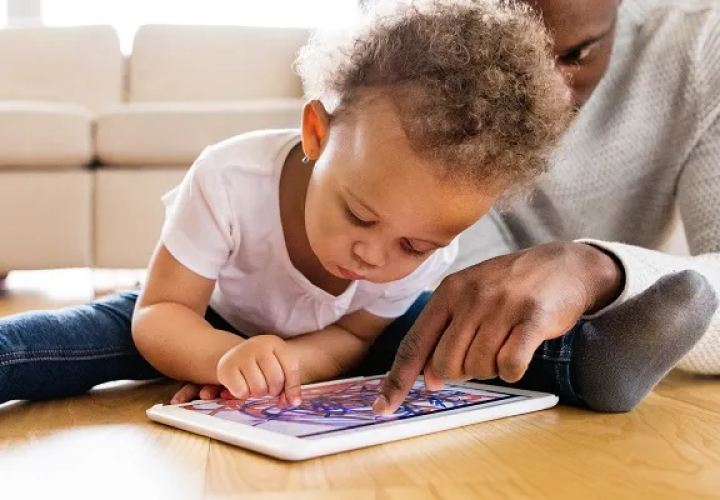Electronic media has assumed a ubiquitous role in our lives, with both positive and negative effects. Screen time has expanded to include television, computers, video games, phones, and tablets. Recently, the World Health Organization (WHO) issued Guidelines on Physical Activity, Sedentary Behavior and Sleep for children under the age of 5. The WHO recommendations for electronic media use are very similar to the American Academy of Pediatrics (AAP) policy statement, Media and Young Minds.
Recognizing the importance of physical activity and play for young children, both organizations recommend that children from 0-18 months of age should not spend any time looking at screens. They also should not spend more than one hour at a time restrained in strollers, swings or car seats, and they should be engaged in interactive floor-based play. When they are awake and sedentary, they should be engaged in reading or storytelling with caregivers. Research has shown that reading to infants and young children stimulates activation of various networks in the brain and enhances early literacy skills. Furthermore, infants benefit from the social interaction with their caregivers.
Between the ages of 18 months and 2 years, guidelines differ between the two organizations. The WHO recommends no screen time for children. However, since devices are so accessible, the AAP recommends no more than one hour of quality electronic programming, and only if children are watching it and interacting with an adult.
For children between 2 and 5 years old, both organizations recommend that screen time should be limited to a maximum of one hour per day. Parents and caregivers should choose high quality programs for their children and co-view the media with them to help children understand it and to make it interactive and applicable to their experience. Using electronic media to distract and entertain, especially for very young children, may impede their development of internal mechanisms of self-regulation. Because hundreds of apps and programs are advertised as “educational” (without scientific evidence), many parents will feel comfortable allowing their children this increased screen time. Time spent sitting with a screen displaces language and play-based interactions and activities. Important pre-academic skills such as self-regulation, empathy, social skills, and problem solving that are learned through environmental exploration and creative and unstructured play-based activities are lost to sedentary media interaction. The WHO recommends that physical activity in this age group include at least 180 minutes spread through out the day in various types of physical activity, including at least one hour of moderate to vigorous intensity activity. Young children need creative, interactive and unplugged playtime away from screens.
While parents used to pack books, toys, and snacks to distract and entertain their young children at the doctor’s office, in the car, or in other environments, the majority of caregivers now hand them a phone or an electronic device. Often parents of older children express an inability to get their children off of their phones or their video games. Electronic media, like other activities, requires parenting rules. Parents need to learn how to say no, set limits, monitor content, and take privileges away when rules are disrespected or broken. The AAP and other organizations have media use planning tools to help families create reasonable family media use plans, such as this one.
In addition, parents must act as role models and mentors with their own media use. Parents’ use of interactive media, especially cell phones, has the potential to distract from parent-child interactions and conversations. Parents’ use of phones for work, for errands, or for social purposes requires attention that they are not then giving to their children, impeding their ability to interact with their children or manage their behavior. On the plus side, video-chatting and Skype allows children to maintain connections with distant grandparents or other family members or parents who may be deployed in the military. Parents can encourage their children to develop healthy media habits by modeling their own.
Finally, the WHO guidelines also include recommendations for sleep as an essential component of good health and fundamental to optimal functioning during childhood. Infants from birth to 1 year of age require 12-16 hours of sleep daily, including naps, while children from 2-5 years of age require 10-14 hours of good quality sleep. Use of electronic media at night and exposure to blue light from screens has been shown to decrease both sleep quality and quantity. Furthermore, short sleep duration has been associated with becoming overweight or obese in childhood, as has excessive sedentary activity and lack of physical activity.
The Kohl’s Start Childhood Off Right (SCOR) program has incorporated these domains into the curriculum for trainings done with pediatric practices and community outreach workers so that consistent messages about healthy lifestyles are disseminated to parents. Early childhood is a period of rapid physical growth and cognitive development, as well as a time when habits and behaviors are formed. Of the many factors that influence the positive and negative effects of media on behavior and development, joint engagement and connection between young children and parents or caregivers during media use is certainly among the most important, and establishing screen time limits early in life is essential.
Follow Advancing Kids by Email
Enter your email address to follow this blog and receive notifications of new posts by email.
